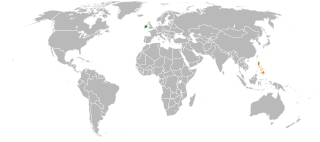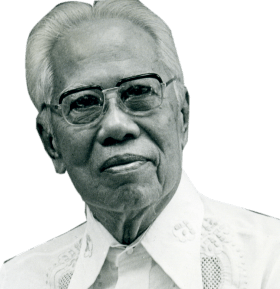
A Little Manila, also known as a Manilatown or Filipinotown, is a community with a large Filipino immigrant and descendant population. Little Manilas are enclaves of Overseas Filipinos consisting of people of Filipino origin living outside of the Philippines.
Doce Pares is a Filipino martial art and a form of Arnis, Kali and Eskrima, that focuses primarily on stick fighting, knife fighting and hand-to-hand combat but also covers grappling and other weapons as well. In reality, the stick is merely considered an extension of the hand, and is meant to represent almost any weapon, from sticks to swords to knives to anything else you can place in your hand and use as a weapon in the modern context. Doce Pares was founded in 1932.
Koreans in the United Kingdom include Korean-born migrants to the United Kingdom and their British-born descendants tracing ancestries from North Korea and South Korea.
Zimbabweans Britons are British people who were born in Zimbabwe or can trace their ancestry to immigrants from Zimbabwe who emigrated to the United Kingdom. While the first natives of the country then known as Southern Rhodesia arrived in Britain in larger numbers from the late-1960s, the majority of immigrants arrived during the 1990s and 2000s. The Zimbabwean community in the UK is extremely diverse, consisting of individuals of differing racial, ethnic, class, and political groups. There are a diverse mix of asylum seekers, professionals, investors, businesspeople, labour migrants, students, graduates, undocumented migrants, and others who have gained British citizenship.
Brazilians in the United Kingdom or Brazilian Britons including Brazilian-born immigrants to the UK and their British-born descendants form the single largest Latin American group in the country.
Colombians in the United Kingdom or Colombian Britons include British citizens or residents who are of Colombian ancestry. According to the 2011 UK Census, the Colombian-born population of England was 25,016, Wales 166, Scotland 507 and Northern Ireland 72.
Iranians in the United Kingdom or British Iranians consist of people of Iranian nationality who have settled in the United Kingdom, as well as British residents and citizens of Iranian heritage. Iranians in the United Kingdom are referred to by hyphenated terms such as British-Iranians, British-Persians, Iranian-Britons, or Persian-Britons. At the time of the 2011 census, 84,735 Iranian-born people resided in the UK. In 2017, the Office for National Statistics estimated the Iranian-born population to be 70,000.
Mexicans in the United Kingdom or Mexican Britons include Mexican-born immigrants to the United Kingdom and their British-born descendants. Although a large percentage of Mexican-born people in the UK are international students, many are also permanently settled and work in the UK as the community expands into its second generation.
Peruvians in the United Kingdom or Peruvian Britons are Peruvian immigrants to the United Kingdom, who form part of the larger Latin American community in the UK. In 2001, the stock of Peruvian-born immigrants was the sixth largest amongst all Latin American immigrants to the UK.
Filipino Austrians are Austrians of full or partial Filipino descent and are part of the so-called Overseas Filipinos. When excluding Afghan, Iraqi and Syrian refugees, Filipinos make up the fourth largest group of Asians within Austria, behind Iranian, Chinese and Indian people and form the largest Southeast-Asian community in the country. The majority of them live in Vienna, the capital of Austria.
Yemenis in the United Kingdom or Yemeni Britons include citizens and non-citizen immigrants in the United Kingdom of Yemeni ancestry, as well as their descendants. Yemenis have been present in the UK since at least the 1860s, with the first Yemenis arriving as sailors and dock workers in the port cities of Northern England and Wales, and despite a smaller population than other British Muslim groups, are likely the longest-established Muslim group in the United Kingdom, with many of these cities retaining a Yemeni population going back several generations.
Thais in the United Kingdom are British citizens who trace their Thai ancestry from migrants who have migrated from Thailand or Thais residing in the United Kingdom for work or educational purposes.
Lebanese people in the United Kingdom include people originating from Lebanon who have migrated to the United Kingdom and their descendants.
British Afghans are British citizens and non-citizen residents born in or with ancestors from, Afghanistan, part of worldwide Afghan diaspora. The Office for National Statistics (ONS) estimates that there were 79,000 people born in Afghanistan living in the UK in 2019.
Ethiopians in the United Kingdom are an ethnic group that consist of Ethiopian immigrants to the United Kingdom as well as their descendants.
Algerians in the United Kingdom are residents of the UK with ancestry from Algeria. They include Algerian-born immigrants and their British-born descendants.

Ireland–Philippines relations refer to the bilateral relations between Ireland and the Philippines. Ireland has an embassy in Manila. The Philippines once had an embassy in Dublin. However, due to supposed financial and organisational burdens, it was forced to close in 2012. Currently, the Philippine embassy in Ireland are represented via London, with an honorary consulate based in Dublin.

Iceland–Philippines relations refers to the bilateral relations of Iceland and the Philippines. Diplomatic ties between the two countries formally established on 24 February 1999. Iceland has its accreditation to the Philippines through its embassy in Tokyo, Japan, and the Philippines' ambassador to Oslo, Norway has also its jurisdiction in Iceland. Both countries established honorary consulates in Reykjavík and Makati, Metro Manila, respectively.
Daniel "Danny" Guba is a Filipino martial artist and a leading practitioner of Eskrima-Kali-Arnis. Guba is a 5 time World Eskrima Kali Arnis Federation (WEKAF) World Champion and the founder of his own style of Doce Pares Eskrima, namely Guba Doce Pares.

Pedro Tamesis Orata was a Filipino educator known as the Father of Barrio High Schools. He is also the founder of the Urdaneta Community College, the country's first community college, and a recipient of the Ramon Magsaysay Award in 1971.







